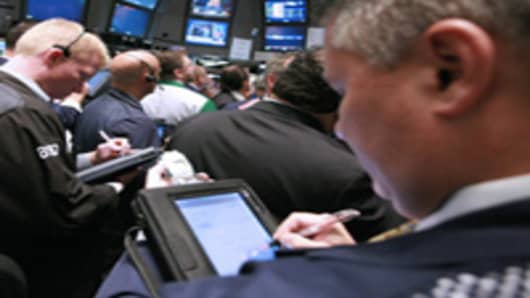With first-quarter earnings expected to be strong and the economy showing more signs of rebounding, analysts say this is the perfect time—for the market to give back some of its sizeable gains of 2010.
Yes, even as the market is likely to get another dose of good news, the consensus among pros is that stocks are overdue for a pullback and could use earnings season as the perfect excuse.
"The numbers are going to be fine—maybe even better than fine. The market's going to say that was discounted in the market's move coming into earnings season," says Uri Landesman, head of global growth strategy for ING Investment Management in New York. "It wouldn't shock me if we have a great earnings period and if at the end of earnings the market is sitting 7 or 8 percent lower than now."
In fact, such a move lower would fit right in with the sell-on-the-news scenario that has accompanied the past two reporting seasons for Wall Street companies.
Though about 80 percent of companies beat earnings expectations both times, the market saw mini-corrections that took the averages down significantly.
After Alcoa kicked off earnings season Jan. 11—a traditional role the Dow component will fill again after the bell today—the Standard & Poor's 500 dropped just under 8 percent through Feb. 8, before turning around and gaining 12 percent.
A repeat performance could well be in the offing even as the S&P is expected to show a 27 percent year-over-year gain in earnings per share.
"[W]ith equity prices at 18-month highs and notching a 6.5% gain (year to date), the potential for upside surprises to favorably impact the general level of stock prices may be limited," Brown Brothers Harriman said in a note to clients. "In a very real sense, we doubt if the reticence shown by analysts and companies has held back investors from pricing in the positive effects of better economic news."
Indeed, investors have had plenty of warning to prepare for strong earnings and play buy-the-rumor before cashing in gains once reporting actually begins.
With 141 S&P companies preannouncing, 60 said results would be better than expected, 72 were negative and nine were in-line with estimates.
Though that is a 1.2-to-1 negative ratio, it's better than the historical average of 2.1 to 1, again indicating much better sentiment as the market recovers from the collapse between October 2007 and March 2009.
"If anything we probably are setting up for a little bit more of a hiccup this time because of how much growth is built in," says Justin Wiggs, vice president of trading at Stifel Nicolaus in Baltimore. "They're not quite priced for perfection, but they're getting close to where they were in the previous quarter since we got rid of the fear."
To be sure, when there's so much sentiment for one direction that's often a good indication the market is heading the opposite way.
At least one strategist thinks the strong belief for a correction could be an indicator that the market actually could advance during earnings.
"There's a potential shake-out if the weak-hands people are getting leery. We could get that contrarian view," says Ryan Detrick, analyst at Schaeffer's Investment Research in Cincinnati. "We wouldn't be shocked at all over the next two weeks if earnings come in kind of strong and we get a pop there."
Detrick says that pop could send the S&P up to 1250, a gain of 4 percent from the current level.
But even if stocks do fall, the general sentiment is that a pullback here would be a constructive sign that the market is moving in a cycle typical of sustained bull markets.
S&P recently has been warning that only once since World War II (in the 1987-1990 run) has a bull market gone without a 10 percent correction.
"Complacency or even enthusiasm may be our biggest near-term concerns," S&P chief investment strategist Sam Stovall wrote in an analysis Monday.
Lack of a pullback during earnings, then, may be more troubling than if the markets did decide to pause.
"This is acting like a very, very good market. The reality is that it's all cycles," says Nadav Baum, executive vice president at BPU Investment Management in Pittsburgh. "What drives this market is fear and greed, and greed hasn't kicked in yet. When it does, you're going to see the market push higher."




